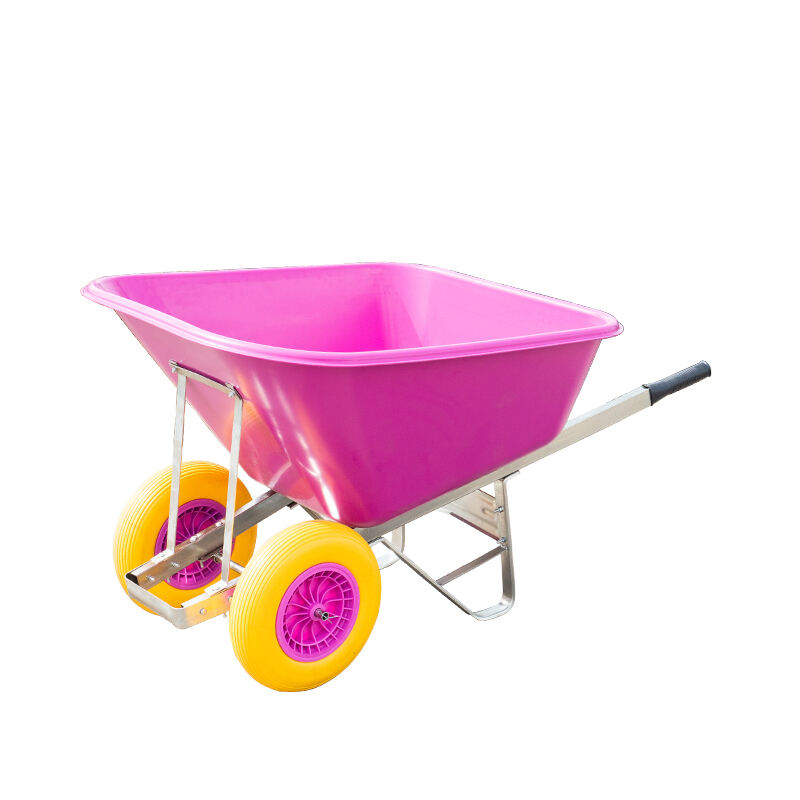שינוי תפעול החקלות הקטנות עם פתרונות ציוד רב-תכליתיים
התפתחות ציוד החקלאות הביאה לפתרונות חדשניים לפעולות חקלאיות בכל קנה מידה. בין ההמצאות הללו, עגלת ATV עלתה ככלי מהפכני המשנה את הדרך בה בעלי ח farms קטנים מתמודדים עם משימות יומיומיות. התוספות החזקות הללו מוכיחה שהן יותר מאשר רק אביזרים – הן הופכות לציוד חיוני שיכול, במקרים רבים, להחליף בצורה יעילה משאיות מסורתיות ליישומים חקלאיים רבים.
מפעילי חוות קטנות מגלה בהדרגה את הרב-תכליתיות והיעילות הכלכלית של שילוב עגלות ATV בתפעול שלהם. יחידות הגמישות הללו מציעות שילוב מרשים של ניידות, יעילות ופונקציונליות מעשית, מה שעושה אותן מתאימות במיוחד לצורך הייחודי של חקלאות בקנה מידה קטן.
תכונות ויכולות חיוניות של גרורי טרקטורונים מודרניים
קיבולת עומס ועיצוב מבני
גרורי טרקטורונים מודרניים מתוכננים עם יכולות נשיאת עומס מרשימות שלעתים קרובות מפתיעות את החדשים בטכנולוגיה. רוב הדגמים האיכותיים יכולים להתמודד עם מטען של בין 1,000 ל-1,500 פאונד, מה שהופך אותם למתאימים להובלת שקי הזנה, כלים וגידולים שנקטפו. המבנה החזק כולל בדרך כלל מסגרות פלדה מחוזקות וסרנים עמידים המבטיחים עמידות גם בתנאי חווה תובעניים.
העיצוב המבני של גרור לטרקטורון מדגיש הן חוזק והן שימושיות פרקטית. דגמים רבים משלבים מאפיינים כמו פאנלים צדדיים נשלפים, מנגנוני השלכה הידראוליים ומערכות מתלה מתכווננות המשפרות את הרבגוניות שלהם. אלמנטים עיצוביים אלה מאפשרים לחקלאים להתאים בקלות את הגרור למשימות שונות לאורך עונת הגידול.
ניהול טרינין ונגישות
יתרון מכריע אחד של עגלת רכב שטח הוא היכולת לנוע בדרכים קשות שעשויות להוות בעיה למשאיות קונבנציונליות. צמד רכב השטח והעגלה יכול להגיע לדרכים צרות בין שורות היבולים, לחצות שדות בוץ ולנוע במרחבים צרים סביב מבני חווה ואזורים לאחסון.
הלחץ הנמוך של צמיגי רכבי שטח על הקרקע, בשילוב עם העיצוב מאוזן של העגלה, מפחית את דיקוק הקרקע – שיקול חשוב לשמירה על תנאי גידול בריאים. תכונה זו הופכת את עגלות רכבי שטח לחשובות במיוחד בעונות הגשומות, כאשר כלי רכב כבדים יותר עלולים לפגוע בשדות ובמרעה.
הטבות כלכליות ויתרונות תפעוליים
השוואת עלות מול כלי רכב מסורתיים
בעת הערכת היבטים פיננסיים, מערכת של עגלת ATV מציגה יתרונות מרשימים לעומת שימור משאית חווה ייעודית. ההשקעה הראשונית נמוכה בהרבה, כשמחירן של עגלות ATV איכותיות הוא רק שבריר ממה שעלותו של משאית חדשה או משומשת. גם עלויות התפעול מופחתות, כיוון ש-ATV צורכים פחות דלק ודורשים בדרך כלל תחזוקה זולה יותר מאשר רכבים גדולים.
עלויות ביטוח מהווים תחום חיסכון נוסף, שכן צמדים של ATV ומשאית נושאת נהנים בדרך כלל מקצבאות נמוכות יותר מאשר משאיות. בנוסף, האופי המכני הפשוט יותר של יחידות אלו מאפשר לחקלאים לעסוק בעצמם בתחזוקה, ובכך לצמצם עוד יותר את עלויות התפעול.
רב-תועלת ויישומים רב-תכליתיים
היתרנות של מ trailer ATV עולה על משימות הובלה בסיסיות. ניתן להגדיר את היחידות הללו ליישומים מיוחדים כמו פיזור שמן, תחבורה של מזון לבעלי חיים או העברת ציוד להשקיה. רבים מהחקלאים מגלים שtrailer ATV אחד יכול למלא מספר תפקידים שדרשו אחרת שימוש בכמה סוגי ציוד שונים.
גמישות זו תורמת ליעילות חווה משופרת ולצמצום מורכבות הציוד. במקום לתחזק מספר רכבים לביצוע משימות שונות, יכולים חקלאים להשקיע בחלפים ואביזרים שונים למערכת עגלת ה-ATV שלהם, וכך ליצור תפעול חלק יותר וזול יותר.
שקולים עקרוניים ליישום
התאמה של ציוד לצרכי החווה
בחירת תצורת נגרר הטרקטורון הנכונה דורשת שיקול דעת מדוקדק של דרישות החווה הספציפיות. גורמים כגון משקלי מטען אופייניים, תנאי שטח ואופי המשימות השוטפות צריכים להנחות את בחירת גודל הנגרר, חומרי הבנייה והמאפיינים. בחירה חכמה מבטיחה שהציוד יענה הן על הצרכים הנוכחיים והן על צמיחה עתידית.
בעלי חוות צריכים גם לקחת בחשבון את דפוסי השימוש העונתיים בעת הגדרת תצורת עגלת ה-ATV. תכונות כמו צדדים הניתנים להמרה, נקודות חיבור מרובות וחומרים עמידים במזג אוויר יכולים לשפר משמעותית את תועלתה של העגלה במהלך השנה.
אינטגרציה עם פעולות קיימות
השלבת עגלת ATV בהפעלת החווה מחייבת לעתים התאמה של דפוסי עבודה קיימים. יצירת אזורי טעינה ופריקה יעילים, הגדרת מסלולי תנועה אופטימליים ופיתוח הליכים חדשים למשימות מסוימות יכולים לעזור למקסם את היתרונות של מעבר זה בציוד.
הכשרת עובדים בחקלאות בשימוש נכון ובהפעלה תקינה של מערכת משאית ATV היא חיונית לפעולת יעילות ובצורה בטוחה. זה כולל הבנת מגבלות משקל, הפצה נכונה של המשקל, ונהלי פעולה בטוחים בסוגי קרקע שונים ותנאי מזג אוויר שונים.
שאלות נפוצות
איזה גודל של גרר ATV הוא הטוב ביותר למשק קטן?
הגודל האידיאלי תלוי בצרכים הספציפיים שלך, אך לרוב החקלאות הקטנות משתפות תועלת מגרר עם קיבולת משלוחים בין 450 ל-680 ק"ג וגודל מיטה של 1.2x1.8 או 1.5x2.4 מטר. גודל זה מספק קיבולת מספקת לרוב המשימות החקלאיות תוך שמירה על ניידות.
מהו עמידותם של גררי ATV בשימוש יומיומי בחקלאות?
גררי ATV איכותיים בנויים לשאת בשימוש יומיומי כבד, ועומדים בדרך כלל מספר שנים עם שימור תקין. דגמים עם מבנה מתכת מצופה אבקה, שבבים חתומים ונקודות לחץ מחוזקות מציעים את החוסן הארוך ביותר ליישומים חקלאיים.
האם גרר ATV יכול להתמודד עם אותן משימות כמו משאית פיקאפ?
בעוד שעגלות ATV אינן יכולות להחליף לחלוטין את כל תפקודיה של משאית מסילון, הן יכולות להתמודד בצורה יעילה עם רוב המשימות במשק קטן, כולל הובלת מזון לבעלי חיים, הזזת ציוד, תחבורה של חומרים ושירות בתהליך הקטיף. המגבלות העיקריות שלהן הן בהובלה על כבישים ובמטענים כבדים במיוחד.
איזו תחזוקה נדרשת למשאית ATV?
תחזוקה רגילה כוללת בדיקת לחץタイres, שימון של יריעות גלגלים, בדיקה של חיבור הגרירה ובחינת השלד למציאת כל נזק. את רוב פעולות התחזוקה ניתן לבצע על ידי הבעלים, מה שעושה את התפעול והתחזוקה פשוטים יותר וזולים בהשוואה לתחזוקת משאיות פיק-אפ.

 EN
EN AR
AR
 BG
BG
 HR
HR
 CS
CS
 DA
DA
 NL
NL
 FI
FI
 FR
FR
 DE
DE
 HI
HI
 IT
IT
 JA
JA
 KO
KO
 NO
NO
 PL
PL
 PT
PT
 RO
RO
 RU
RU
 ES
ES
 SV
SV
 TL
TL
 IW
IW
 ID
ID
 LV
LV
 LT
LT
 SR
SR
 SK
SK
 VI
VI
 ET
ET
 HU
HU
 TH
TH
 TR
TR
 AF
AF
 MS
MS
 LO
LO
 LA
LA
 MR
MR


